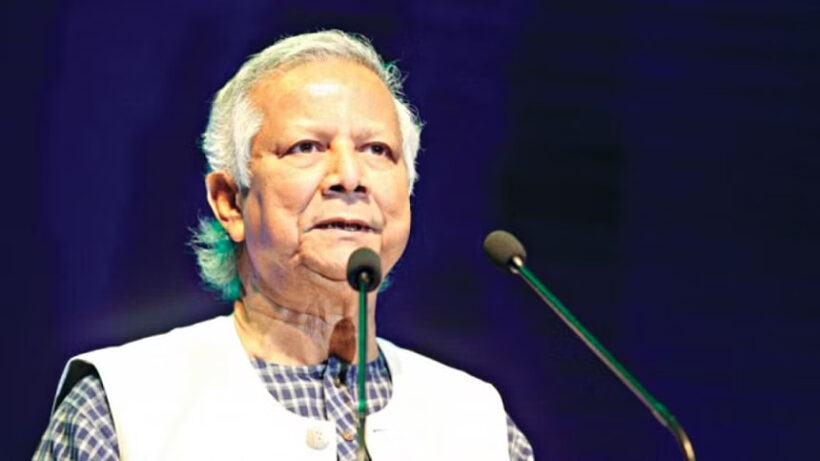Recently, 40 global figures wrote an open letter to the Prime Minister of Bangladesh expressing their concern over Professor Yunus’ well-being. The letter was published in Washington Post as an advertisement. Many global personas signed the letter, including former UN General Secretary Ban-Ki Moon, U2 singer Bono, Former US Vice President Al Gore, Actress Sharon Stone, and many more. Citing the achievements of Yunus and Grameen Initiatives, the global figures asked Bangladesh to stop government investigation on these organizations to end the ‘harassment’ of the Noble Laureate.
By Motiur Rahman
Against this backdrop, it is worth revisiting the question, is government merely ‘investigating’ Professor Yunus? Or is it the corruption and irregularities that the state apparatus is investigating into?
The Letter: Statement and Advertisement
The open letter addresses the Prime Minister of Bangladesh directly. Interestingly, the letter came as something other than a statement or through the traditional method of public circulation. The letter was published as an advertisement in the Washington Post. Approximately the five-column advertising costs USD 73000. Due to the advertisement category, the letter is also not endorsed by its publisher, the Washington Post.
However, the letter endorsed that Professor Yunus does not earn any profit from Grameen Phone or Grameen Telecom. Therefore, it is ‘painful’ to watch him being investigated. The letter also directly termed the ongoing investigations against Grameen Social Business Initiatives harassment.
Corruption and Irregularities, Not Professor Yunus
In reality, the status apparatus, including the Anti-Corruption Commission (ACC) and the National Bureau of Revenue (NBR), only do their routine work investigating corruption and irregularities. It is worth mentioning that there is no open investigation against Professor Yunus. The Investigations are against the social business entities he established—for instance, the Grameen Worker’s writ demanding profit-sharing against Grameen Telecom.
Business cases are prevalent in Bangladesh. Due to complex laws and inexperience, corporate entities often face such lawsuits and investigations. These entities also have dedicated legal teams for these purposes. Mass sacking, not sharing profit, or failure to comply with labor law often leads the status apparatus to investigate the matters to fight corruption and irregularities.
Grameen’s probes are of such nature. Yet, these cases draw extra attention from the media as these are the Noble Laureate’s brands.
It seems Professor Yunus’ insecurity leads him to believe that these lawsuits and investigations are aimed at harassing him. His insecurities came from his imprudent political decision and over-reliance on influential global friends.
‘Our Troubled Friend’: Professor Yunus, 1/11, and Afterwards
The seasoned economist and practitioner of microfinance played a notorious role during Bangladesh’s military-backed regime in 2007-2008. The quasi-civilian government wanted to oust both of Bangladesh’s largest political parties, the Awami League (AL) and Bangladesh Nationalist Party (BNP). Many allege that the western institutions and their local office were behind such conspiracies to establish a puppet regime for their purposes. Amid that murky water, Professor Yunus established his party with the blessing of the then-incumbent government named the ‘Nagorik Shakti Party’. Leaders from both AL and BNP saw his venture as skeptical at that time. Thus, the Professor took an undemocratic decision to side with the incumbent regime against the democratic struggle of Bangladesh.
However, the seasoned economist failed to understand the pulse of the mass as they continued supporting the AL and BNP. Finally, through an election, the regime was ousted, restoring democracy. Yunus’ Nagorik Shakti Party remained a ‘stillborn’, and Yunus’ role against democracy tarnished much of his image in the public sphere.
Owing to his global influence, Yunus often tries to influence the government’s decisions as a political actor. Prime Minister Sheikh Hasina alleged that Professor Yunus used his influential friends to stop World Bank financing of the Padma Bridge Project. PM alleged that Professor Yunus lobbied with Hillary Clinton to stop the funding from putting pressure on the government. Dr. Yunus retaliated against the government as the Supreme Court gave the verdict that forced him to resign from the Managing Director of Grameen Bank over age consideration.
Since then, the Noble Laureate has developed his own insecurity and paranoia against the government. The latest letter, therefore may be driven by him influencing his close friends to write an open letter to pressure the government.
But the reality suggests that the government has no issue with Professor Yunus. The State apparatus, including ACC and NBR, is only doing its routine work probing into the Grameen firms, not into the individual, Professor Muhammad Yunus.
It seems Professor Yunus is only exaggerating his own insecurity to his influential network worldwide, which may drive them to write the letter and advertise it with such hefty money on humanitarian grounds. But in reality, the investigations are only routine work, and they are not ‘harassment’. The only harassing part, perhaps, is the extra attention from the media into such regular probes by ACC and NBR, and the press covers attentively due to the news value of Professor Yunus. Therefore, the letter is an unnecessary alarm that may only pressure the government.
Motiur Rahman is a Dhaka-based independent researcher and analyst










